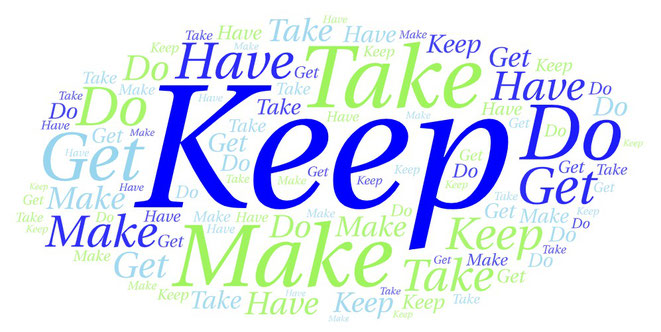Descripción: Descubre la importancia de las COLLOCATIONS en inglés y cómo mejorar tu fluidez y precisión en el habla y la escritura. Explora ejemplos y consejos prácticos para dominar estas combinaciones de palabras en nuestro último artículo sobre collocations en inglés.

KEEP (mantener):
Keep a promise (Cumplir una promesa)
Ejemplo: She always keeps her promises. (Ella siempre cumple sus promesas).
Keep a secret (Guardar un secreto)
Ejemplo: Can you keep a secret? (¿Puedes guardar un secreto?).
Keep in touch (Mantenerse en contacto)
Ejemplo: We should keep in touch after you move. (Deberíamos mantenernos en contacto después de que te mudes).
Keep an eye on (Mantener un ojo en)
Ejemplo: I'll keep an eye on the kids while you're out. (Voy a mantener un ojo en los niños mientras estás fuera).
Keep the peace (Mantener la paz)
Ejemplo: It's important to keep the peace in our neighborhood. (Es importante mantener la paz en nuestro vecindario).
GET (conseguir):
Get a job (Conseguir un trabajo)
Ejemplo: I need to get a job to pay my bills. (Necesito conseguir un trabajo para pagar mis facturas).
Get an education (Obtener una educación)
Ejemplo: Education is essential. Everyone should get an education. (La educación es esencial. Todos deberían obtener una educación).
Get a promotion (Conseguir un ascenso)
Ejemplo: He worked hard and finally got a promotion at work. (Trabajó duro y finalmente consiguió un ascenso en el trabajo).
Get married (Casarse)
Ejemplo: They got married last summer in a beautiful ceremony. (Se casaron el verano pasado en una hermosa ceremonia).
Get lost (Perderse)
Ejemplo: I got lost in the city and had to ask for directions. (Me perdí en la ciudad y tuve que pedir direcciones).
HAVE (tener):
Have a good time (Tener un buen tiempo)
Ejemplo: We had a good time at the party last night. (Tuvimos un buen tiempo en la fiesta de anoche).
Have a meeting (Tener una reunión)
Ejemplo: I have a meeting with my boss in the afternoon. (Tengo una reunión con mi jefe por la tarde).
Have a conversation (Tener una conversación)
Ejemplo: Let's have a conversation about your future plans. (Tengamos una conversación sobre tus planes futuros).
Have a baby (Tener un bebé)
Ejemplo: They are excited to have a baby next year. (Están emocionados de tener un bebé el próximo año).
Have a problem (Tener un problema)
Ejemplo: If you ever have a problem, don't hesitate to ask for help. (Si alguna vez tienes un problema, no dudes en pedir ayuda).
DO (hacer):
Do your homework (Hacer tu tarea)
Ejemplo: I need to do my homework before dinner. (Necesito hacer mi tarea antes de cenar).
Do the dishes (Lavar los platos)
Ejemplo: It's your turn to do the dishes tonight. (Hoy te toca lavar los platos).
Do your best (Hacer lo mejor que puedas)
Ejemplo: Always do your best in everything you do. (Siempre haz lo mejor que puedas en todo lo que hagas).
Do a favor (Hacer un favor)
Ejemplo: Can you do me a favor and pick up some groceries? (¿Puedes hacerme un favor y comprar algunos víveres?).
Do research (Hacer investigación)
Ejemplo: They need to do more research before making a decision. (Necesitan hacer más investigación antes de tomar una decisión).
MAKE (hacer):
Make a decision (Tomar una decisión)
Ejemplo: It's time to make a decision about our future plans. (Es hora de tomar una decisión sobre nuestros planes futuros).
Make a reservation (Hacer una reserva)
Ejemplo: I called to make a reservation for dinner tonight. (Llamé para hacer una reserva para cenar esta noche).
Make a suggestion (Hacer una sugerencia)
Ejemplo: If you have any ideas, please make a suggestion. (Si tienes alguna idea, por favor haz una sugerencia).
Make a difference (Hacer una diferencia)
Ejemplo: Volunteering can make a difference in your community. (El voluntariado puede hacer una diferencia en tu comunidad).
Make a mistake (Cometer un error)
Ejemplo: It's okay to make a mistake as long as you learn from it. (Está bien cometer un error siempre y cuando aprendas de él).
TAKE (tomar):
Take a break (Tomar un descanso)
Ejemplo: I need to take a break after working for hours. (Necesito tomar un descanso después de trabajar durante horas).
Take a photo (Tomar una foto)
Ejemplo: Let's take a photo to remember this moment. (Tomemos una foto para recordar este momento).
Take a chance (Tomar una oportunidad)
Ejemplo: Sometimes you need to take a chance to achieve your goals. (A veces necesitas tomar una oportunidad para alcanzar tus metas).
Take a shower (Tomar una ducha)
Ejemplo: I like to take a shower in the morning to wake up. (Me gusta tomar una ducha por la mañana para despertar).
Take notes (Tomar apuntes)
Ejemplo: It's important to take notes during the lecture to study later. (Es importante tomar apuntes durante la conferencia para estudiar después).
